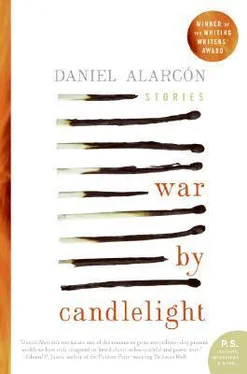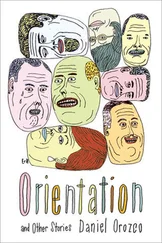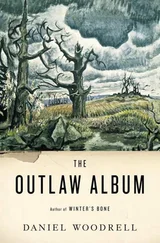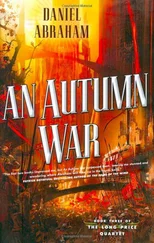I was eight when we moved. My father was a stranger, it seemed, even to my mother. They held hands on the bus to Lima, and I slept in her lap, even though I was too old for that. It was early January; we left Pasco iced over, the syncopated drumming of hail falling on its metal roofs. We watched the speckled orange lights fade behind us, and when I woke up it was dawn and we were pulling into the station in Lima. “There are bad people here,” my old man warned us. “Be mosca, Chino. You’re an hombrecito now. You have to take care of your mother.”
I’d been to the city before, two years earlier, though I scarcely remembered it. My father had come home to Pasco one day and carried me off for three weeks. He’d led me through the city, pointing at the important buildings; he’d shown me the movement of the streets. I remember my mother telling me that at age six I was already more traveled than she was. Now she held my hand as the world swirled around us, and I watched my old man push his way through the men at the open door of the bus’s baggage hold. It was just after dawn. They elbowed and pushed one another, the crowd swelling this way and that, and my father, who was not tall or particularly strong, disappeared into the center of it. My mother and I waited. I stared down a mustachioed man who was circling us, his greedy eyes tugging at the bag my mother had wedged between us. Then there was yelling: one man pushed another, accusing him of trying to steal his packages. The accuser had a foot planted firmly on top of one of his boxes. It was taped, a name and address printed on one side.
“ Oye compadre, que chucha quieres con mis cosas? ”
“ Ah? Perdón, tío, my mistake.”
The second man was my father. It was an accident, he protested. Packages look alike. My father’s long arms were bent, palms up, a charmless shrug. But the older man was furious, his face red and his fists clenched. “ No mierda, aquí no hay errores . Thief!” The other men pulled them apart; in the blur of it, my father grinned at me, and I realized that we’d brought only bags, no boxes.
In front of the Congress, along Avenida Abancay, a protest had spilled off the sidewalk, and traffic was stalled for five city blocks. The protesters were construction workers or telephone workers or obstetricians. Social movements, like all predators, sense weakness: the president was teetering; half his cabinet had resigned. But on the street it still looked like Lima, beautiful, disgraced Lima, unhappy and impervious to change. I’d been to a press conference in the suburbs and was on a bus headed to the city. The air was sticky and as thick as soup. A svelte policewoman in her beige uniform directed cars east, through the miniature streets of Barrios Altos, where cramped quintas fell in on each other, where kids laced up their cheap sneakers, scanning the slow-moving traffic for an opportunity. The day before, there had been robberies, entire buses shaken down at a red light, and we were all tense, bags clutched tightly against our chests. It was the first week of carnival, and everyone from age five to fifteen (which, in Barrios Altos, is nearly everyone) was in the streets carrying water balloons, menacing, eager. The dilemma we faced was which way to suffer.
“ Oye, chato. Close the window.”
“ Estas loco. It’s too hot.”
The tug-of-war began, between those who were willing to accept the risk of theft or pranks in order to counter the oppressive heat, and those who were not. The driver strained against his homemade seat belt. Windows opened and closed, pulled and pushed from all sides, and on the sidewalks, youths salivated, hands in buckets, kneading water balloons as if they were their best friend’s girlfriend’s tits. Then it came from everywhere at once: from the narrows between crumbling buildings, and from the roofs as well, kids tossing overhand and underhand, unloading balloons two at a time. Water splashed through the cracked windows. The sidewalks glistened, littered with the exploded insides of red and green and white balloons. The primary target, I soon realized, was not our bus, or any bus, or, as is often the case, a young woman in a white shirt. Instead, on the sidewalk, dodging water balloons, there was a clown.
He was a vender, a traveling salesman, a poor working clown. He’d stepped off a bus and found himself in the crosshairs of a hundred children. He was struggling to get his bearings. He tucked his head into his chest so that his multicolored wig bore the brunt of the attack, strands of pink and red sagging beneath the soaking. He had nowhere to go: a step forward, a step back, a step to the wall, a step to the curb — he danced clumsily in his big clown shoes, the balloons raining on him. There was laughter on our bus, laughter that built community: passengers emerged from their private meditations to point and laugh and ridicule. Ah Lima! The clown looked up helplessly, his suit clung to him. The chorus came from the children; to the staccato rhythm of bursting balloons and impatient horns, they sang: Payaso mojado! Payaso mojado! Our driver tapped his horn along to it; we crept forward ever so slightly. Wet clown, the children sang, to the tune of an old Alianza Lima chant. Then the ticket collector, moved by pity, opened the door and pulled the clown in. We fell silent.
He dripped on the corrugated metal floor of our bus, his white face paint running, crinkled pink hairs sticking to his cheeks. It had colored his neck, had stained his clown collar. He made me want to cry, this poor clown, this pathetic specimen of Limeño. Hermano! Causa! The bus didn’t move, and then it did. The volley of balloons receded. And then, in the uncomfortable silence, disheveled though he was, the clown went to work. He reached into an inside pocket and took out a large plastic bag of mints. Tiny drops of water slipped off the bag. “ Señores y Señoras, Damas y Caballeros, ” he proclaimed. “I’m here today to offer you a new product, a product you may never have seen before. Developed with the newest and most refined technology in European mint processing…”
We could still hear the protest on the west side of the Congressional building. Wooden spoons against pots, a dull metallic complaint, rhythmless, the thick voice of the people with their unfocused rage. The disgruntled and disaffected threw stones and burned tires and scattered through the antique streets of the city. The clown in his plastic clown voice tried to sell us mints, his smile a force of will.
The newsroom swarmed with activity; a presidential pronouncement on the economy had set everyone to work. There were rumors: a cabinet member had fled the country. I didn’t pay much attention. I left the office early and went to San Juan to see my mother. I took a copy of the paper to show her the obituary, a peace offering of sorts.
San Juan, my old street: the same crooked tree casting thin shadows in the vanishing light of dusk. I’d been living downtown for six years, but I recognized some faces. Don Segundo, from the restaurant, who had fed me for free a hundred times when we were short. Señora Nelida, from the corner, who would never give back our ball if it landed on her roof. Our old neighbor Elisa was there too, sitting, as she always did, on a wooden stool in front of her store. One of the legs was shorter than the others. She’d repaired it with a phone book, wedged between the ground and the offending leg.
“ Vecina, ” I said.
We spoke for a minute, the exchange easy and familiar. What I was doing. My work at the paper. How proud they were of me in the neighborhood when they read my name in print. I knew this last part wasn’t true, at least not among the people my age. I’d seen how my old friends looked at me: aware, perhaps, that I had once existed as a part of their world, but dismissive of every claim I could have of belonging there still. We were disappearing fragments of each other’s history, fading tracers against a clear night sky.
Читать дальше












